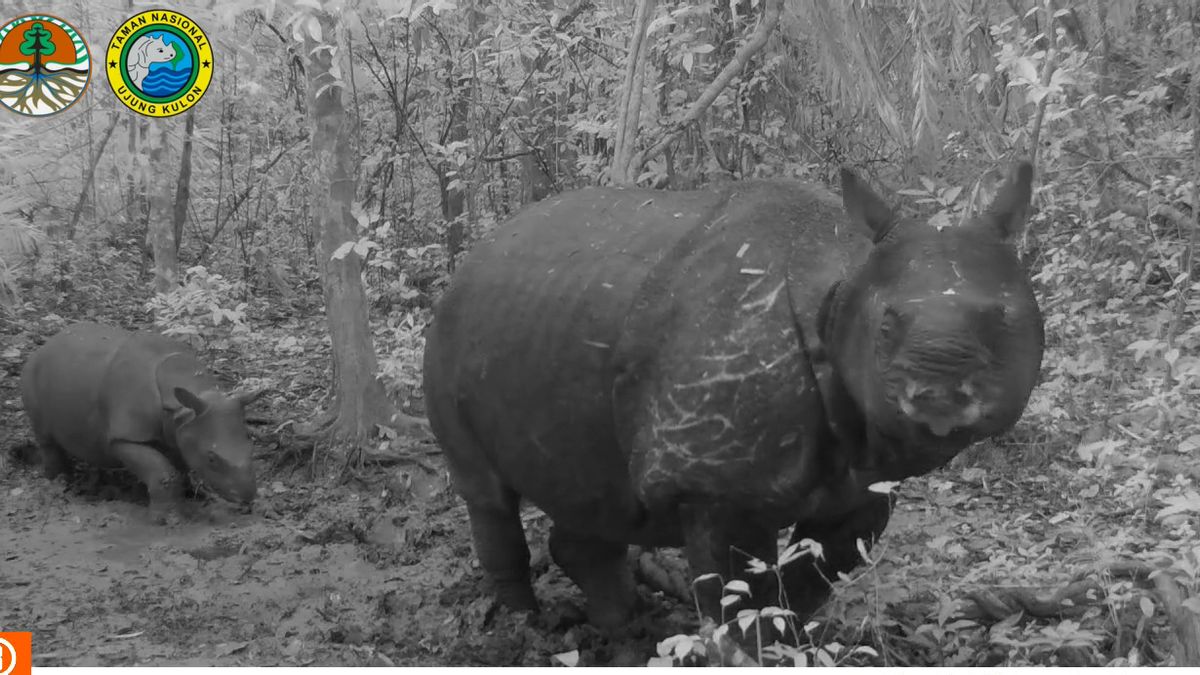JAKARTA - Wildlife conservation efforts in Indonesia have again provided good news. Two rhino cubs (Rhinoceros sondaicus) or commonly called the Javan rhinoceros, were recorded as born in their natural habitat, Ujung Kulon National Park (TNUK).
The recording of the birth of the two rhinos was obtained by the Javan Rhino Monitoring Team at the TNUK Center through a camera trap.
From the camera trap recording, it is known that the first Javan rhino calf is male with ID. 089,2022, recorded on September 18, 2022 at 08.29 WIB from the parent named RATU (ID 035,2011).
In addition, it was also recorded that a rhino calf whose gender is not yet known, but has been given an ID. 090,2022, was born to a mother named MENUR (ID. 063,2015).
Minister of Environment and Forestry (KLHK) Siti Nurbaya said this birth increased the number of rhino cubs this year after being recorded in the early period this year as a newborn Javan rhino calf.
"With this picture, in addition to recordings of the births of various other wildlife in 2022 and in recent years, it shows optimism for the protection of wildlife in Indonesia which is getting better with the hard work of various parties, and of course we will continue to improve it," said Siti Nurbaya in an electronic message received in Jakarta, Sunday, December 18th.
Furthermore, Minister Siti revealed that the new birth of this Javan rhino calf was a routine and continuous effort from the Javan Rhino Monitoring Team at the TNUK Center, which worked tirelessly at the site level, including through camera-based monitoring.
Upon the birth of the two Javan rhino cubs, Minister Siti gave the name “ wac” for one of the male rhino cubs.
"The new birth of the two Javan rhino cubs proves that the Ministry of Environment and Forestry continues to strive to increase the Javan rhino population and ensure that it will not become extinct," said Minister Siti.
Minister Siti advised that the ranks should not be complacent with the joy of the birth of this Javan rhino calf.
Although the Javan rhino can breed, that does not mean the habitat and individual Javan rhino is safe from various disturbances. Hunting activities, predators (floats/foreigners), disease, possible inbreeding, and natural disasters block us in front of us that threaten the existence and sustainability of the Javan rhino.
"We and all parties who assist in efforts to preserve the Javan rhino must not be careless and always anticipate any threats that may occur," he added.
Monitoring of the Javan rhino is a routine activity carried out in an effort to obtain time series data from one of the key species owned by Ujung Kulon National Park, in addition to the Javanese gibbon (Hylobates moloch) and the Javanese bull (Javanicus boss).
"Thank you to the Javan Badak Monitoring Team at the TNUK Center for trying to provide the best in monitoring the presence of the Javan rhino in Ujung Kulon National Park, as well as the role of all parties who have helped in maintaining and preserving it," concluded Minister Siti.
The English, Chinese, Japanese, Arabic, and French versions are automatically generated by the AI. So there may still be inaccuracies in translating, please always see Indonesian as our main language. (system supported by DigitalSiber.id)
Tags les plus populaires
#NCP #Seuil présidentiel #Hasto Kristiyanto #squid game 2Populaire
07 Januari 2025, 05:00













